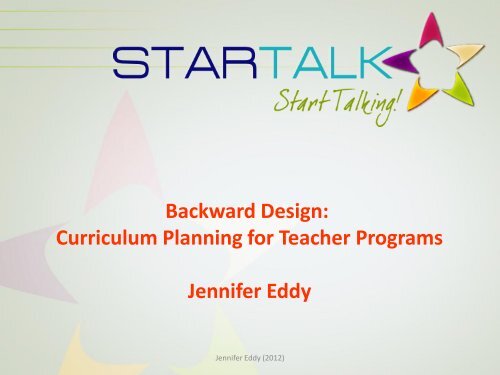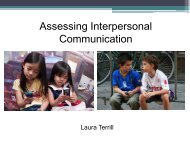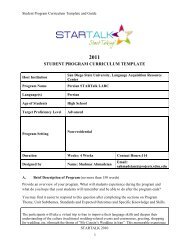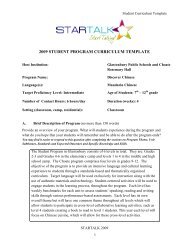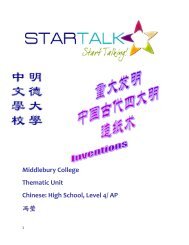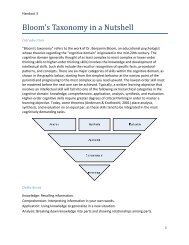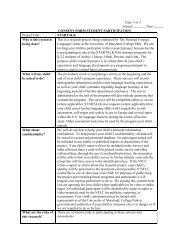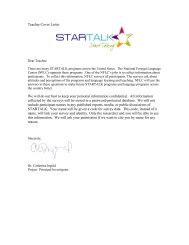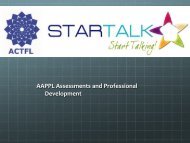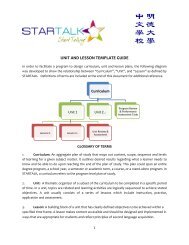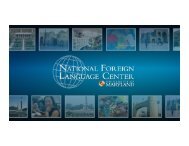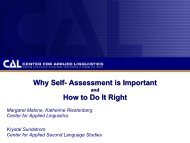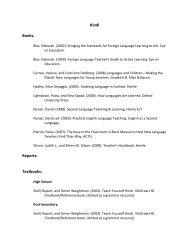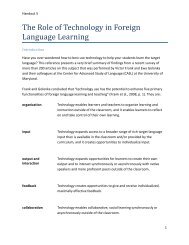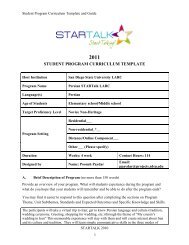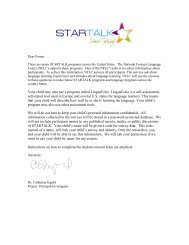Backward Design: Curriculum Planning for Student - STARTALK
Backward Design: Curriculum Planning for Student - STARTALK
Backward Design: Curriculum Planning for Student - STARTALK
You also want an ePaper? Increase the reach of your titles
YUMPU automatically turns print PDFs into web optimized ePapers that Google loves.
<strong>Backward</strong> <strong>Design</strong>:<br />
<strong>Curriculum</strong> <strong>Planning</strong> <strong>for</strong> Teacher Programs<br />
Jennifer Eddy<br />
Jennifer Eddy (2012)
<strong>STARTALK</strong> MISSION<br />
… to increase the number of Americans learning, speaking,<br />
and teaching critical need <strong>for</strong>eign languages by offering<br />
students and teachers of these languages creative and<br />
engaging summer experiences that strive to exemplify best<br />
practices in language education and in language teacher<br />
development, <strong>for</strong>ming an extensive community of practice<br />
that seeks continuous improvement in such criteria as<br />
outcomes-driven program design, standards-based<br />
curriculum planning, learner-centered approaches,<br />
excellence in selection and development of materials, and<br />
meaningful assessment of outcomes.<br />
Jennifer Eddy (2012)
<strong>STARTALK</strong>-endorsed Principles <strong>for</strong><br />
Conducting per<strong>for</strong>mancebased<br />
assessments<br />
Using the target language and<br />
providing comprehensible<br />
input <strong>for</strong> instruction<br />
Effective Teaching<br />
Implementing standardsbased<br />
and thematically<br />
organized curriculum<br />
Adapting and using ageappropriate<br />
authentic<br />
materials<br />
Jennifer Eddy (2012)<br />
Integrating culture, content<br />
and language in a world<br />
language classroom<br />
Facilitating a learnercentered<br />
classroom
<strong>Backward</strong> design<br />
1. Identify desired results<br />
2. Determine acceptable evidence<br />
of learning<br />
3. Plan learning experiences<br />
& instruction<br />
www.startalk.umd.edu<br />
Jennifer Eddy (2012)
Stage 1<br />
Decide what you<br />
want teachers to<br />
be able to do by the<br />
end of the program<br />
Jennifer Eddy (2012)
Stage 1<br />
Decide what you<br />
want teachers to<br />
know and be able to<br />
do at the end of<br />
the program<br />
Stage 2<br />
Determine<br />
how teachers will<br />
show you what they<br />
can do<br />
Jennifer Eddy (2012)
Stage 1<br />
Decide what you<br />
want teachers to be<br />
able to do at the<br />
end of the program<br />
Stage 3<br />
Plan lessons that<br />
will enable teachers<br />
to show you the<br />
results you want<br />
and what<br />
they Can Do<br />
Jennifer Eddy (2012)<br />
Stage 2<br />
Determine<br />
how teachers will<br />
show you what they<br />
can do
1. Identify desired<br />
results<br />
2. Determine<br />
acceptable<br />
evidence<br />
of learning<br />
3. Plan learning<br />
experiences<br />
& instruction<br />
Jen’s Top Ten !<br />
Section Content<br />
A Brief Description of Program<br />
B Major Focus of the Program<br />
C Pre-requisites<br />
D In<strong>for</strong>mation on Career Options and<br />
Pathways to Certification<br />
E Content and Evidence of Learning<br />
F Assessment of Participant Progress<br />
and Per<strong>for</strong>mance<br />
G Program Outline and Schedule<br />
H Instructional Strategies<br />
I Materials & Other Resources<br />
J Technology Integration<br />
Jennifer Eddy (2012)
Program Description<br />
Write a description stating<br />
program goals and desired outcomes.<br />
What teachers will be able to do<br />
by the end of program?<br />
Teachers will learn linguistic issues<br />
<strong>for</strong> the teaching X.<br />
Teacher candidates enroll in Methods<br />
course. See attached syllabus.<br />
Teachers will<br />
understand that…<br />
Teachers will be able to…<br />
1. Identify desired results<br />
Jennifer Eddy (2012)
Major Focus of the Program<br />
Consider: Length of program<br />
Experience of teachers<br />
Summative Assessment<br />
Strategies<br />
Major Focus of the Program<br />
•Standards-based instruction<br />
•Per<strong>for</strong>mance Assessment <strong>Design</strong><br />
•Using Authentic materials<br />
1. Identify desired results<br />
Jennifer Eddy (2012)
Pre-requisites<br />
Do participants need a certain level of English proficiency to<br />
participate fully in your program?<br />
Should participants have teaching experience?<br />
Should there be a qualifying essay or interview?<br />
Pre-requisites<br />
Yes, the participants will need to have spoken and written English<br />
proficiency <strong>for</strong> college level work.<br />
or<br />
Participants need to have Arabic language teaching experience in<br />
any relevant K-16 setting.<br />
Jennifer Eddy (2012)<br />
1. Identify desired<br />
results
In<strong>for</strong>mation on Career<br />
Options and Pathways to<br />
Certification<br />
Is the program part of a pathway to<br />
certification? If yes, please explain.<br />
This institute is being offered with an option<br />
<strong>for</strong> three (3) graduate credit hours, which<br />
serves as an equivalent to a <strong>for</strong>eign/world<br />
language methods course. It will count in<br />
our licensure program and the state will<br />
accept it as a pathway to certification.<br />
Not directly. However, teachers will receive<br />
continues education units from Michigan<br />
State University.<br />
or<br />
Does the program provide in<strong>for</strong>mation on<br />
certification? Does it provide in<strong>for</strong>mation on<br />
career options? Please explain.<br />
Certification in<strong>for</strong>mation was provided<br />
along with the application and participants<br />
are strongly urged to consider this. We will<br />
make available admissions in<strong>for</strong>mation as<br />
well as academic planning and advising<br />
sheets.<br />
In<strong>for</strong>mation on the status and process <strong>for</strong><br />
achieving Arabic language certification in<br />
Michigan will be shared with participants.<br />
1. Identify desired results<br />
Jennifer Eddy (2012)
Reflection<br />
What are major foci of your program? Limit to a few achievable<br />
areas.<br />
1.<br />
2.<br />
3.<br />
1. Identify desired results<br />
Jennifer Eddy (2012)
Content and Evidence of Learning<br />
See teacher<br />
sample templates<br />
<strong>for</strong> more<br />
examples.<br />
2.a. Demonstrating cultural<br />
understandings<br />
4.c. Selecting and designing<br />
instructional materials<br />
Standards Key Concepts/In<strong>for</strong>mation Participants can….<br />
6 (Professionalism) Life Cycle of a<br />
World Language Teacher<br />
Ability to integrate culture in<br />
language instruction<br />
Incorporating and adapting authentic<br />
materials<br />
Participate in a coaching/mentoring<br />
environment that builds and<br />
enhances professional competence<br />
<strong>Design</strong> lessons and activities that<br />
integrate products, practices, and<br />
perspectives of the target society.<br />
<strong>Design</strong> lessons and activities<br />
incorporating level- and age-<br />
appropriate authentic materials.<br />
Give, receive and incorporate<br />
constructive feedback on practice<br />
2. Determine acceptable evidence<br />
Jennifer Eddy (2012)<br />
of learning
Assessment of Participant Progress and<br />
Per<strong>for</strong>mance<br />
Evidence / Product Brief Descripton<br />
Per<strong>for</strong>mance<br />
Assessment Tasks<br />
Participants will design per<strong>for</strong>mance assessments in the three modes of communication aligned with their<br />
chosen theme. They will use culturally authentic material <strong>for</strong> the tasks.<br />
Lesson Plan Plan a standards-based lesson and teach several components of it to students. Reflect on the lesson and<br />
the constructive feedback received from mentor teachers on how to improve the lesson in the future.<br />
Micro-teaching Towards the end of the program, participants will teach their standards-based mini-lessons in Hindi or<br />
Urdu to their cohort demonstrating best practices of teaching & learning. The mini-lessons will be<br />
assessed by the instructors and peers based on a per<strong>for</strong>mance-based rubric.<br />
2. Determine acceptable evidence<br />
of learning<br />
Jennifer Eddy (2012)
Per<strong>for</strong>mance Assessment<br />
<strong>Student</strong>s are asked to acquire<br />
in<strong>for</strong>mation through an interpretive<br />
mode task. This task uses culturally<br />
authentic material.<br />
Then, they react to that in<strong>for</strong>mation<br />
by interacting with others. This is<br />
unrehearsed and unscripted.<br />
Finally, they create a written or oral<br />
product that incorporates<br />
in<strong>for</strong>mation acquired through the<br />
other two modes.<br />
in the Three Modes<br />
Presentational mode<br />
Jennifer Eddy (2012)<br />
Interpersonal mode<br />
Interpretive mode
Turnarounds <strong>for</strong> Transfer<br />
• Theme: Travel<br />
• Objective: To know the tourist sites<br />
in __.<br />
• Task: Matching column to test<br />
locations of tourist sites<br />
Turnaround:<br />
• Where people choose to travel<br />
depends a lot on their interests and<br />
needs.<br />
Jennifer Eddy (2012)
Interpretive Task<br />
Travel<br />
Using the different travel brochures and websites from<br />
various towns and cities in ___ , categorize on your chart<br />
which towns or cities are the best places to visit <strong>for</strong> the<br />
following:<br />
Music<br />
Historic Sites<br />
Easy transportation<br />
Special Events<br />
Places great <strong>for</strong> families<br />
Shopping<br />
Low cost or free places to go<br />
Art or local crafts<br />
Jennifer Eddy (2012)
Interpersonal Task<br />
Travel<br />
• Using the chart, tell your partner the towns or<br />
cities you would like or not like to visit, based<br />
on the in<strong>for</strong>mation from the categories.<br />
Jennifer Eddy (2012)
Presentational Task<br />
Turnaround <strong>for</strong> Transfer<br />
• You are a travel agent specializing in travel to<br />
_____. Your clients are all different. Create an<br />
itinerary suited <strong>for</strong> each group, keeping in<br />
mind the possible interests and needs of the<br />
client.<br />
• 1. A family of 5 with young children.<br />
• 2. A person who is a history buff.<br />
• 3. Three students with a limited budget.<br />
• 4. Grandparents who love small towns, local<br />
crafts, and music.<br />
Jennifer Eddy (2012)
Interpretive Mode<br />
• Comprehension of words, concepts, ideas,<br />
meaning of entire piece<br />
• One way-> between the person and the piece<br />
• Learners are exposed to a wide variety of culturally<br />
authentic materials such as texts, films, works of art,<br />
songs, poems, advertisements, music videos<br />
TRANSLATION IS NOT AN<br />
INTERPRETIVE MODE TASK<br />
Jennifer Eddy (2012)
Sample Interpretive tasks<br />
• listen with visuals<br />
• fill in graphs, charts, <strong>for</strong>ms, graphic organizers, venn diagrams<br />
• follow a route on a map<br />
• check-off items in a list<br />
• draw what is described<br />
• put sentences in correct order<br />
• listen <strong>for</strong> the gist—identify main idea<br />
• guess meaning from context<br />
• identify/categorize/classify thematic vocabulary<br />
• identify/categorize/classify authentic material<br />
• create questions from info in the piece<br />
• identify specific in<strong>for</strong>mation found in the piece<br />
• compose a title or headline<br />
• paraphrase in native language/target language<br />
• brainstorm and categorize synonyms<br />
Jennifer Eddy (2012)
Interpersonal Mode<br />
• Interpersonal mode tasks are two-way, spontaneous<br />
exchanges that involve negotiation of meaning between<br />
people.<br />
• These tasks are unrehearsed, unrefined, non-scripted.<br />
• May be based on in<strong>for</strong>mation acquired in the interpretive<br />
mode.<br />
MEMORIZED MATERIAL SUCH<br />
AS A SKIT IS NOT AN<br />
INTERPERSONAL MODE TASK.<br />
Jennifer Eddy (2012)
Sample Interpersonal tasks<br />
The following situations require students to actively negotiate<br />
meaning while initiating, maintaining and sustaining a<br />
conversation.<br />
• Making a purchase<br />
• Meeting and greeting<br />
• Ordering in a restaurant<br />
• Asking directions<br />
• Face to face or telephone conversations<br />
• Talking about friends and family<br />
• Discussing events of the day<br />
• Making plans<br />
• Negotiating who does what, gets what,<br />
with who, how, and where<br />
Jennifer Eddy (2012)
Presentational tasks<br />
Presentational mode tasks allow learners time to<br />
rehearse, revise, rewrite, consult sources, or otherwise<br />
prepare ahead of time.<br />
These tasks require learners to use the language <strong>for</strong> a<br />
real world purpose other than display <strong>for</strong> the teacher<br />
or classroom.<br />
Presentational mode tasks allow learners to use<br />
language in new and different contexts.<br />
Jennifer Eddy (2012)
Sample Presentational tasks<br />
• Brochure or Itinerary<br />
• Letter<br />
• Web pages/social networking sites<br />
• Video or Podcasts<br />
• Advertisement<br />
• Agenda, Schedule or Plan of the day, week<br />
• New beginning or ending of story, song<br />
• Demonstration<br />
• TV or Radio spot<br />
• <strong>Design</strong> a survey and present findings<br />
• Public Service Announcement or Infomercial<br />
• Essays, Plays<br />
• Poem, Song, Rap<br />
• Photostory, Voicethread<br />
Jennifer Eddy (2012)
Three Modes of Communication<br />
Interpretive<br />
Presentational<br />
Jennifer Eddy (2012)<br />
Quizzes on the Standards<br />
Translation<br />
Fill in the blank<br />
Write a culture paper<br />
How to teach past tense<br />
Imbalance of theory and<br />
practice: knowledge but no<br />
design or implementation<br />
Interpersonal
Check <strong>for</strong> Understanding<br />
What is the mode of communication?<br />
Talking about what<br />
to do on the weekend.<br />
Watching a travel video<br />
and jot down places of interest.<br />
Prepare a poster about your<br />
favorite sport.<br />
Send a letter to an e-pal.<br />
Create a graphic organizer <strong>for</strong><br />
new vocabulary.<br />
Create a skit where you<br />
buy something in the market.<br />
Jennifer Eddy (2012)<br />
Interpersonal<br />
Interpretive<br />
Presentational<br />
Presentational<br />
Interpretive<br />
Presentational
Resources <strong>for</strong> Teacher Programs Available on<br />
<strong>Student</strong> Online <strong>Curriculum</strong> Guide<br />
Teacher programs may find elements of the student online<br />
curriculum guide useful when planning assessment and<br />
instructional activities <strong>for</strong> their programs. Several topics are<br />
addressed using ACTFL/Annenberg videos, <strong>STARTALK</strong><br />
Multimedia Workshops and Reflection Questions. The topics<br />
addressed include:<br />
• Thematic <strong>Planning</strong><br />
• Assessment<br />
• Use of target language<br />
• <strong>Student</strong>-centered classrooms<br />
• Meaningful interaction in the target language<br />
• Integration of language, culture and content<br />
• Differentiation<br />
• Materials and Resources<br />
• Technology<br />
http://startalk.umd.edu/curriculum-guide/<br />
Jennifer Eddy (2012)
Reflection<br />
What evidence will be collected to demonstrate that<br />
participants are learning?<br />
1.<br />
2.<br />
3.<br />
4.<br />
2. Determine acceptable evidence<br />
Jennifer Eddy (2012)<br />
of learning
Program Outline and Schedule<br />
Timeline Content<br />
Day 1<br />
Day 2<br />
Day 3<br />
• Is there a balance of theory to practice?<br />
• Are there multiple opportunities <strong>for</strong> teachers to apply what<br />
they learned?<br />
• Limit guest lecturers. When they do present, follow those<br />
topics immediately with what teachers will DO with this info.<br />
“Closing Instructional Gaps: <strong>Planning</strong> Tools <strong>for</strong> Transitioning to<br />
Learner-Centered Instruction in Arabic and Chinese Classrooms<br />
“Closing Instructional Gaps in Assessment: Transitioning to<br />
Learner-Centered Approaches”<br />
“Transitioning to Learner-Centered Instruction with Early<br />
Language Learners”<br />
Jennifer Eddy (2012)<br />
1) Dr. X<br />
2) Dr.Y<br />
3) Dr. Z<br />
4) Dr. X returns<br />
3. Plan learning<br />
experiences<br />
& instruction
Instructional Strategies<br />
How will your program ensure that the following<br />
best practices are incorporated into your program?<br />
The Teacher Template asks <strong>for</strong> strategies that will:<br />
• Implement a learner-centered approach to teacher development<br />
• Differentiate instruction based on participants’ needs<br />
• Provide mentoring and coaching<br />
• Incorporate hands-on learning<br />
• Provide opportunities <strong>for</strong> micro-lab/student teaching<br />
• Compare and contrast cultural ways of learning and teaching<br />
• Allow <strong>for</strong> peer sharing and collaborative learning<br />
• Engage in meaningful reflection<br />
3. Plan learning experiences<br />
Jennifer Eddy (2012)<br />
& instruction
Instructional Strategies<br />
How will your program model best<br />
practices?<br />
Implement a learner-centered approach to<br />
teacher development<br />
Differentiate instruction based on<br />
participants’ needs<br />
Provide mentoring and coaching<br />
Provide opportunities <strong>for</strong> micro-lab/student<br />
teaching<br />
Incorporate hands-on learning<br />
Allow <strong>for</strong> peer sharing and collaborative<br />
learning<br />
Readings and discussion is delivered via<br />
BlackBoard be<strong>for</strong>e the onsite course.<br />
The second week of the program will consist<br />
of four teaching opportunities per day.<br />
Participants will teach two sessions and<br />
observe two sessions.<br />
Teachers will develop a lesson in<br />
collaboration with two other teachers. After<br />
teaching the lesson, there will be time<br />
allowed <strong>for</strong> debriefing and reflection.<br />
3. Plan learning experiences<br />
Jennifer Eddy (2012)<br />
& instruction
Materials and Other Resources<br />
• Online <strong>Curriculum</strong> Guide (OCG) <strong>Student</strong><br />
• Online <strong>Curriculum</strong> Guide (OCG) Teacher<br />
• Classroom Video Collection<br />
• Multimedia Teacher Workshops<br />
• Language-Specific Materials<br />
• <strong>Curriculum</strong> <strong>Design</strong> Materials<br />
• Characteristics of Effective Lessons<br />
• Unit and Lesson <strong>Planning</strong> Guides<br />
Materials/Resources Description<br />
Required reading, including<br />
textbooks<br />
Realia/Authentic Materials<br />
Multimedia<br />
Links to relevant websites<br />
and annotations about the<br />
site<br />
Other (please specify)<br />
One methods textbook<br />
3. Plan learning experiences<br />
& instruction<br />
Jennifer Eddy (2012)
Culturally authentic materials are<br />
made by and <strong>for</strong> the people<br />
of that culture.<br />
Consider using the following materials:<br />
• Newspapers<br />
• Catalogs<br />
• Internet sites<br />
• Blogs<br />
• Recipes<br />
• Magazines<br />
• Poetry<br />
• Conversations<br />
• TV public service<br />
announcements<br />
• Radio commercials,<br />
announcements<br />
• Announcements<br />
• Music<br />
• Film and theatre<br />
• Signs<br />
• Schedules<br />
• Maps<br />
• Cartoons<br />
• Podcasts<br />
• Game shows<br />
• Youth-oriented TV shows<br />
3. Plan learning experiences<br />
Jennifer Eddy (2012)<br />
& instruction
Technology Integration<br />
We might not see all the ways you integrated<br />
technology on the site visit day. Describe here<br />
how you used <strong>STARTALK</strong> funds to support your<br />
goals.<br />
Technology Tools Explanation<br />
BlackBoard and Skype Delivered materials to participants ahead<br />
of program; Skype meetings<br />
Flip cameras Participants recorded mini lessons <strong>for</strong><br />
later reflection.<br />
3. Plan learning experiences<br />
& Jennifer instruction<br />
Eddy (2012)
Reflection<br />
How will you describe the following in your program?<br />
1. Timeline of balanced instruction to practice<br />
2. Instructional strategies that model best practices<br />
3. Instructional strategies that respond to program goals<br />
and assessments<br />
4. A variety of materials that meet program goals<br />
3. Plan learning experiences<br />
Jennifer Eddy (2012)<br />
& instruction
Putting it all Together<br />
Work with your team leader <strong>for</strong> revising your template<br />
Jennifer Eddy (2012)
<strong>STARTALK</strong> Resource List<br />
•Online <strong>Curriculum</strong> Guide (OCG) <strong>Student</strong><br />
•Online <strong>Curriculum</strong> Guide (OCG) Teacher<br />
•Classroom Video Collection<br />
•Multimedia Teacher Workshops<br />
•Language-Specific Materials<br />
•<strong>Curriculum</strong> <strong>Design</strong> Materials<br />
•Characteristics of Effective Lessons<br />
•Unit and Lesson <strong>Planning</strong> Guides<br />
To access this material go to<br />
http://startalk.umd.edu/resources<br />
Jennifer Eddy (2012)
Questions <strong>for</strong> Jennifer<br />
Please keep in touch!<br />
WorldLanguageEd@aol.com<br />
Jennifer Eddy (2012)
Ticket out the Door<br />
What two things really helped today?<br />
1.<br />
2.<br />
Write one question you still have.<br />
Q:<br />
Enjoy the rest of the conference!<br />
Jennifer Eddy (2012)


